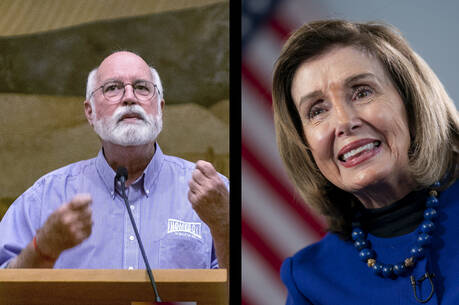Several summers ago, I was walking up Sixth Avenue in Manhattan after work when I was passed by a man standing on the back bumper of a water truck. Holding a long hose affixed to a metal rod, he was performing the same task again and again: As the truck stopped at each sidewalk lamppost with a flowerpot attached, he would delicately raise his apparatus 30 feet in the air and water the plants within.
How does one get this job?
Don’t get me wrong: I have no complaints about my current employment, for which I am much better suited than anything requiring a truck. But there was something about his work that felt oddly comforting: the ritual application of the water; the syncope created by the roar of the truck in transit and the silence of the act of watering itself; the careful task of keeping something alive in a place no flower should bloom. Every writer—maybe every artist—must have a fantasy about life being as ordered as that and so quietly nurturing and productive. Alas, most writers are probably more like Gerard Manley Hopkins, S.J., who famously once wrote:
birds build—but not I build; no, but strain,
Time’s eunuch, and not breed one work that wakes.
Mine, O thou lord of life, send my roots rain.
I am not sure if Hopkins’s theme there was writing or sex, but you get his point. Writers usually do not tend to their flowerpots in orderly fashion, and so the appearance (or endurance) of the blossoms can seem like a moment of divine intervention. (Sometimes in the form of an angel known as “an editor.”)
Gerard Manley Hopkins, S.J.: "birds build—but not I build; no, but strain,/ Time’s eunuch, and not breed one work that wakes./ Mine, O thou lord of life, send my roots rain."
Both of the features in this special literary issue center on authors who seem to view writing that way: as a process of drawing life from soil that is fertile but stubborn, which gives and takes away in due season. In an excerpt from A Place Called Mississippi, W. Ralph Eubanks waxes eloquent on the literary landscape of his home state, small in size and yet occupying an outsized place in the world of American letters. “It is the beauty of the land mixed with the state’s complex history that inspires and perplexes its writers,” he writes. “That is the burden one feels when writing about Mississippi, because it is a place that everyone knows about—or at least claims to—yet few are willing to understand.”
Our second feature is a profile of a Russian writer with whom not enough Americans are familiar: Olga Sedakova. A poet, essayist, translator and ethnographer, she is also “the most important Christian poet in the world today,” according to Jim Curtis. Spending her formative years as a somewhat solitary soul in the arid cultural milieu of the Brezhnev-era Soviet Union, Ms. Sedakova flourished as a poet and a thinker within the confines of tiny Moscow apartments, environments where artistic endeavors could be nurtured in secret. In his survey of her works and days, Mr. Curtis asks a question that seems fair to answer in the affirmative: “Is Olga Sedakova Russia’s next Nobel laureate?”
A change of pace for us can be found in Nick Sawicki’s profile of Mark Carney, the author of Value(s). Mr. Carney was the governor of the Bank of Canada and the Bank of England and is now the United Nations’ special envoy for climate action and finance. No bloodthirsty capitalist he, Mr. Carney lays out a blueprint for the future of financial markets that is informed by his decades of work in the financial sector but also inflected by the teachings of Pope Francis on solidarity and economic justice—and maybe he throws in a few quotes from Virgil here and there.
These pages offer much more from the world of books, including a reflection on the ideal place to grow up Catholic (it is not where you think), a reconsideration of classic children’s tales, profiles of novelists and economists, our requisite look back at Flannery O’Connor (after all, we must keep up appearances), poetry and, of course, plenty of book reviews as well. We also honor our generous benefactors with a special listing in this issue.
Twice a year we publish an extra issue of America dedicated to books and all things literary; one in planting season and one at harvest time. They offer an opportunity to grow a little literary garden of our own. They are also a chance to share with our authors, editors and readers the experience of watching it all come together and bloom.








